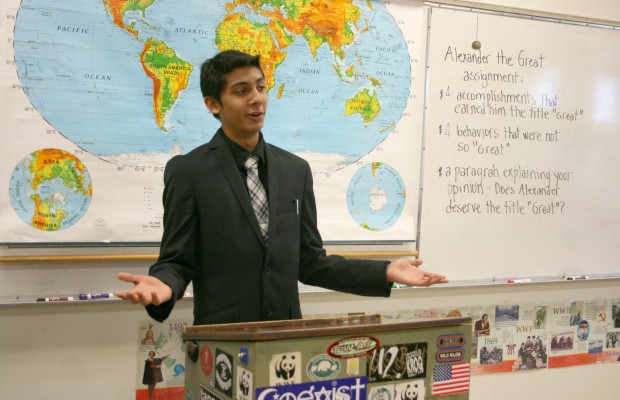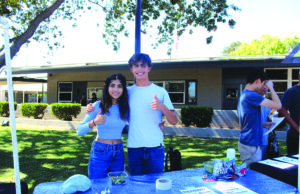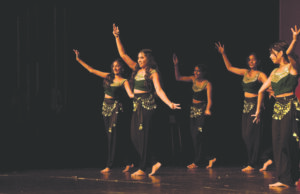Thinking Out Loud

Public speaking may be frightening to some, but for those in the Speech and Debate club, it is second nature.
The club has grown to include around 30 students since it was founded in 2012. Those in the club can choose to participate in either speech or debate, with some opting to do both. According to Jessica Han, founder and club president, speech is considered to be “individual and … memorized, based on presentation, composure, and acting” while debate is “research and not memorized, more focused on thinking on your feet.” Members compete against other schools around once a month.
The club meets on a regular basis on Tuesdays from 5:30 to 7:30 p.m. and Wednesdays at lunch. During this time members “fine-tune speeches and debates” and prepare for upcoming competitions with the help of John Spencer, Speech and Debate coach, and Miharu Altmire, club advisor.
The club starts preparing for a competition over a month before at home and during club meetings. “First we have to find our pieces and do our research … other than that it is really just refinement and getting comfortable with your research,” Han said.
“You do most of the work at home and come and kind of fine-tune it in the meetings,” Rena Dvoretzky, speech specialist and junior said. “You are expected to rehearse your speech (at home) and at practice everyone will go in front of the group and deliver the speech … the coach and everyone else on the team will give critiques.”
During a tournament, those competing in a speech category present their speech in front of a judge and fellow competitors in a series of three rounds. Meanwhile, those in debate also have three rounds but is more complex in the procedure. The structure varies for the types of speech and debate.
“So they let both sides present their arguments. Then … there is time for crossfire, so you have time for direct arguments and you get to ask each other questions and try to poke holes in each others’ arguments,” Han said. “And after that you go back and you have your own speeches and you repeat your arguments … then you have a speech at the end to summarize your case and basically say why you win.”
Students are scored on how you present and interpret the speech and character for speech. “In each round you get a ranking of first to sixth place and then there is a final ranking of the entire category based on the previous rankings and speaker points, which is the speed you are speaking at, how well you carry yourself, and just speaking skills, which is really the tiebreaker,” Dvoretzky said.
Meanwhile in debate you either win or lose each round, which combined with speaker points are used to calculate the final winner. After the competition, trophies and certificates are presented during an awards ceremony held at the school.
“It really depends on who your judge is. There is a list of things judges look for but I tell students … it’s pretty subjective. It is really what your judge thinks about how you speak, not necessarily the content,” Altmire said.
On Jan. 31, the Speech and Debate Club hosted a tournament on campus. Students competed against 30 other schools for 12 hours in a multitude of different categories, including Original Prose and Poetry, Oratorical Interpretation, and Original Oratory.
Several members received recognition in their categories. Rena Dvoretzky placed 5th place out of 53 people entered in Oratorical Interpretation and was awarded a trophy. Taylor Wang and Raevyn Walker received “Excellent” certificates in Oratorical Interpretation. Jessica Han and Zoie Wong received “Superior” certificates in Original Prose and Poetry. Ashwin Vasudevan received an “Excellent” certificate in Spontaneous Argumentation, and Akash Velu received an “Excellent” certificate in Original Oratory.
“Overall, I think the team did pretty well. I’m very proud of all of the certificate and trophy winners, as we’re still a pretty young team,” Altmire said.




1 Comment